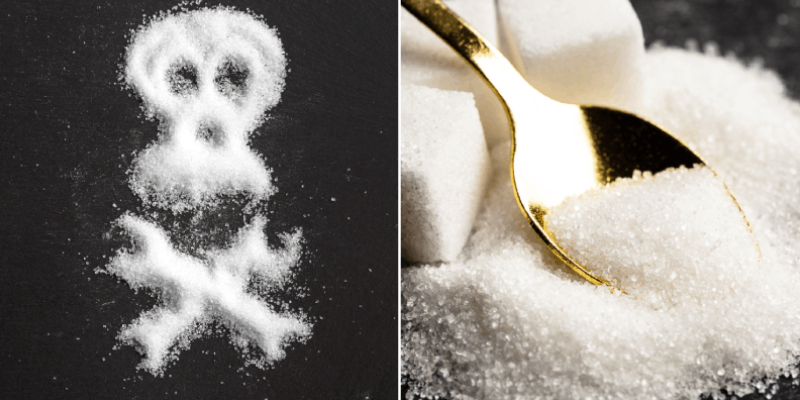Losing weight can often feel like an uphill battle
Many individuals embark on a weight loss journey with the best intentions, only to find that their progress is slow, inconsistent, or even non-existent. If you’ve ever asked yourself, “Why can’t I lose weight?”—you’re not alone. While diet and exercise are the obvious starting points for weight loss, there are other underlying factors that may be sabotaging your efforts. These factors include stress, environmental influences, genetics, and the excessive amount of sugar found in processed foods.
This blog will delve into the less obvious but equally important factors that could be holding you back, backed by research to provide a clearer understanding of the challenges you might be facing.

Stress: The Silent Weight Gain Culprit
Stress is an inevitable part of life, but chronic stress can have a profound impact on your ability to lose weight. When you’re under stress, your body releases cortisol, a hormone that is often called the “stress hormone.” Elevated levels of cortisol can have a direct effect on fat storage and hunger levels, making weight loss a more difficult process.
How Cortisol Impacts Weight
Cortisol can increase your appetite and cravings for sugary, high-fat, and salty foods. This is part of the body’s “fight or flight” response—a system that prioritizes survival in stressful situations. The body seeks quick sources of energy (like sugar and fat), believing it may need to act quickly to get through a stressful event.
Research from *Obesity Reviews* found that chronic stress can lead to long-term increases in abdominal fat, even in individuals who maintain a healthy diet and exercise regularly . This fat, known as visceral fat, is particularly harmful as it surrounds vital organs and is associated with an increased risk of cardiovascular disease, diabetes, and metabolic syndrome.
Managing Stress to Aid Weight Loss
Incorporating stress management techniques into your routine can play a key role in aiding weight loss. Here are some strategies:
Mindfulness and Meditation: Studies from the *American Psychological Association* show that mindfulness can significantly reduce stress and improve emotional eating behaviors.
Physical Activity: Exercise has been shown to decrease stress and improve mood by boosting levels of endorphins.
Adequate Sleep: Poor sleep has been linked to higher cortisol levels and increased appetite. Make sure you’re getting 7-9 hours of quality sleep per night.
Environmental Factors: The Hidden Influences
Your environment plays a significant role in shaping your habits, including how and what you eat. Factors such as your workplace, social life, and even the design of your kitchen can have a surprising impact on your ability to lose weight.
Social and Work Environment
In a work environment where unhealthy snacks or quick fast food options are readily available, it’s easy to fall into habits that are not conducive to weight loss. Furthermore, office stress, long working hours, and limited time for exercise can compound the problem.
A study in the *Journal of Health Psychology* showed that individuals who work in high-stress environments or who face social pressure to indulge in unhealthy eating are more likely to struggle with weight loss . Social factors can also contribute to emotional eating, especially in situations where food is used as a coping mechanism for stress or social interaction.
Home Environment
The design and layout of your home, particularly your kitchen, can also influence your eating habits. Studies suggest that individuals are more likely to snack on unhealthy options when such foods are easily accessible or visible in their homes. Keeping healthy snacks in clear containers and storing unhealthy ones out of sight can reduce impulsive eating.

Genetics: The Role of Heredity in Weight Loss
While lifestyle choices like diet and exercise are essential, your genetic makeup also plays a significant role in determining how easy or difficult it is for you to lose weight. Some people are genetically predisposed to carry more body fat, and their metabolic rate may be slower than others. This is often referred to as a “genetically thrifty” metabolism, which causes the body to store fat more efficiently in times of caloric surplus.
The Science Behind Genetic Factors
Research published in *Nature Genetics* has identified over 300 gene variants associated with obesity and metabolic functions, with genes like FTO (Fat Mass and Obesity-Associated Gene) playing a prominent role. Individuals with certain variants of the FTO gene may have a higher risk of obesity and may find it more challenging to lose weight .
Additionally, the hormone leptin, which signals the brain when you’re full, is regulated by genetics. People with leptin resistance—a genetic condition—may not get the “full” signal and can continue eating even when their body has had enough calories.
Can You Overcome Genetic Predispositions?
While you can’t change your DNA, understanding your genetic predispositions can help tailor your approach to weight loss. Genetic testing services now offer personalized weight loss plans based on your DNA, taking into account factors like how you metabolize fat and carbohydrates. Combining this knowledge with a well-structured diet and exercise routine can help mitigate the effects of unfavorable genetics.
Processed Foods: Excess Sugar and Hidden Calories
One of the most overlooked factors in weight loss struggles is the excessive consumption of processed foods, which often contain high levels of sugar. Many processed foods are marketed as healthy, but upon closer inspection, they contain added sugars that can spike your blood sugar and lead to weight gain.

The Problem with Sugar
Excess sugar in your diet leads to increased fat storage, especially around the abdominal area. The rapid increase in blood sugar levels after consuming sugary foods triggers the release of insulin, a hormone that helps the body absorb glucose. However, when too much insulin is produced, it can lead to insulin resistance—a condition where your body doesn’t respond properly to insulin. Insulin resistance is closely linked to obesity and is a precursor to type 2 diabetes.
Research published in *The American Journal of Clinical Nutrition* found that diets high in added sugars contribute to greater fat accumulation and make it more difficult to lose weight, even when calorie intake is controlled . Additionally, sugar can lead to increased cravings and overconsumption of high-calorie, nutrient-poor foods.
Hidden Sugars in Processed Foods
It’s important to be aware of where sugars are hiding in your diet. Even foods that don’t taste sweet can contain significant amounts of added sugar. Common culprits include:
- Flavored yogurts
- Sauces (e.g., ketchup, barbecue sauce)
- Granola bars
- Breakfast cereals
By reducing your intake of processed foods and focusing on whole, nutrient-dense options, you can help regulate your blood sugar levels and improve your chances of losing weight.
Emotional Eating and Mental Health
Emotional eating is another significant barrier to weight loss that often goes unrecognized. Many people turn to food for comfort during times of stress, sadness, or boredom. While emotional eating provides a temporary escape, it can result in overeating and weight gain over time.
The Link Between Emotions and Food
When you eat for emotional reasons rather than hunger, it’s easy to consume more calories than your body needs. Emotional eating often involves high-calorie, sugary, and fatty foods that provide short-term relief but long-term harm. A study from *Appetite Journal* highlighted that emotional eating is strongly linked to weight gain, particularly in individuals with high levels of stress and anxiety .
Overcoming Emotional Eating
Recognizing emotional eating triggers and developing healthier coping strategies is crucial for long-term weight loss. Here are some strategies:
Journaling: Writing down what you eat and how you feel can help identify patterns in emotional eating.
Mindful Eating: Paying close attention to hunger and fullness cues can reduce emotional overeating.
Therapy: Cognitive-behavioral therapy (CBT) can be highly effective in addressing emotional eating.
Conclusion
If you’re struggling to lose weight, it’s essential to look beyond the common advice of “eat less and move more.” Factors like stress, environmental influences, genetics, and excessive sugar in processed foods all play critical roles in weight management. Understanding these hidden barriers can give you the tools to break through weight loss plateaus and achieve your health goals.
By taking a holistic approach and addressing all these factors, you can create a more sustainable path to weight loss. Remember, weight loss is not a one-size-fits-all journey, and understanding the underlying reasons why you may be struggling is the first step toward lasting change.
References
1. Obesity Reviews*: Chronic Stress and Weight Gain
2. Journal of Health Psychology: Social Environment and Eating Habits
3. Nature Genetics: Genetic Factors in Obesity
4. The American Journal of Clinical Nutrition: Sugar and Fat Storage
5. Appetite Journal: Emotional Eating and Weight Gain

18 School Road, Reepham,
Norwich, UK, NR10 4JP
+44 (0)1603 336 315
[email protected]


